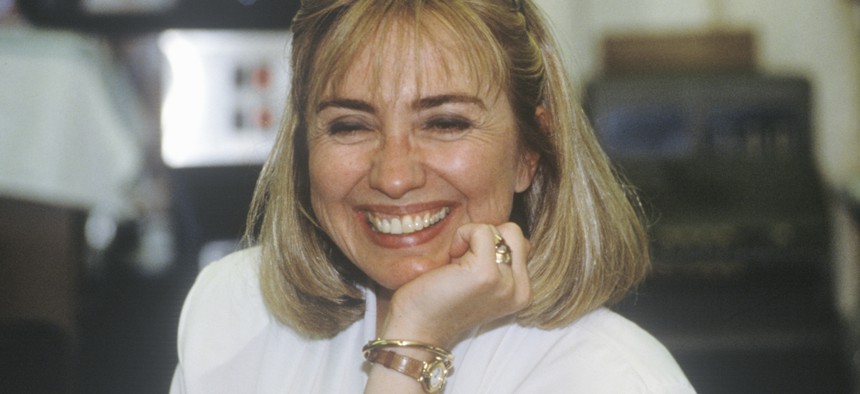
Hillary Clinton greets voters in 1992. American Spirit / Shutterstock.com
Clinton's Email Scandal Doesn't Register With Young Voters
The youngest members of the 2016 electorate don't remember her first time as a White House resident, and they see her differently because of it.
Republicans pounced on revelations that Hillary Clinton had used a personal email account as secretary of State not just to attack her aspirations to win the White House, but to evoke the worst aspects of the first time she resided there. Hoping to dredge up memories of the endless Whitewater-turned-Monica Lewinsky investigations of Bill Clinton's presidency, GOP voices promised a 2016 run by the former First Lady would be plagued by the same problems that dinged her husband.
Republican National Committee Chairman Reince Priebus summed up the argument in a tweet: "Remember all the #Clinton scandals ... That's not what America needs again".
But the absolute youngest voters of the 2016 election don't remember the "Clinton scandals" of the 1990s—they weren't born yet. Even for slightly older voters, memories of the 1990s are dominated by lunch, recess, Nickelodeon, and the Spice Girls—a voter who will be 25 on Election Day was about 10 when Bill Clinton left office. Instead, their first memory of Hillary Clinton is not of the First Lady in a scandal-plagued White House. It's of the woman who put "18 million cracks" in the presidential glass ceiling in 2008 and became a popular secretary of State shortly thereafter.
Among those young voters, Clinton and her team have a chance to define the 1990s and her role in it. As well as being a time of scandal, the Clinton White House era was also a period of great prosperity and relative peace, particularly compared to the turbulent decade that followed.
And if she succeeds in recrafting that image, Clinton can not only build on a traditional advantage in the Democratic election, she gets a second chance at a task on which she was thoroughly bested by then-candidate Obama in 2008: making a connection with the youngest segment of the electorate.
"Millennials and Gen Xers are actually some of the most supportive of Hillary Clinton," said Democratic pollster Celinda Lake. "It's the best of both worlds: While they don't personally remember the 90s, they have a sense that it was a much better time … but they don't remember the scandals, they don't care about Monica Lewinsky."
But where Team Clinton sees an opportunity in these new voters, Republicans see weakness—and their own chance to make inroads among the youngest voters. They argue that by Election Day, first-time ballot casters will have heard much more about Clinton's past than they have so far and, as a consequence, like the candidate much less.
"Polling shows that the more young people, like all demographics, learn about Hillary Clinton the less they like her," Republican National Committee spokeswoman Allison Moore said. "Younger voters are looking for a candidate they can relate to, not someone mired in scandal since before they were born."
In the campaign's early stages, it's hard to tell who's making their message stick. Polls show Clinton is considerably stronger among younger voters than she is among the electorate as a whole. An ABC News/Washington Post survey out Thursday found Clinton's favorability rating among 18- to 39-year-olds at 56 percent, with just 37 percent who view her unfavorably. That's a net favorability of 19 points—compared with her standing among all adults, where she's running close to even (49 percent to 46 percent).
Despite Clinton's three decades in public life, young people also think Clinton represents something new: two-thirds of the demographic said she "has new ideas for the country's future," compared with 55 percent of all adults who say the same.
Their goodwill for her also extends to revelations that Clinton used a purely personal email account while she serving as secretary of State. In the ABC/Post poll, voters overall were evenly split (46 percent each) on whether Clinton is "honest and trustworthy." But among young people, 56 percent see her as trustworthy, compared with just 33 percent who do not.
And asked if Clinton had done enough to explain the email system, just over half of all adults (51 percent) in a mid-March CNN/ORC poll said she had not done enough, and 46 percent said she had. But among young voters, the result was almost flipped: 52 percent of 18- to 34-year-olds said Clinton had done enough to address the stories, while 45 percent said she hadn't.
That doesn't necessarily mean, however, that younger voters have a rosier view of Clinton's past than do their parents. Young voters traditionally favor Democratic candidates by hefty margins—a trend that predates millennials. And there's limited evidence available that young Democrats are any more excited about Clinton then their elder fellow partisans. (Few polls break down their data both by party affiliation and by age, in part because when the numbers are subsected to that small of a sample, the results become statistically unwieldy.)
A Clinton spokesman did not comment on the campaign's planned overtures toward young voters. Clinton's early hires, however, suggest a focus on youth. Campaign manager-to-be Robby Mook has a background in grassroots organizing, and the campaign also is bringing onseveral key staffers from the pro-Clinton super PAC Ready for Hillary, including executive director Adam Parkhomenko and Young Americans director Rachel Schneider.
In large part because of Ready for Hillary, the campaign will have a foundation to build upon: the super PAC that's been doing grassroots organizing on her behalf has made colleges a focus of its outreach. The group has representatives on more than 200 campuses nationwide, and the Ready for Hillary bus has stopped at more than 100 campuses on its cross-country tour.
In interviews with young Democrats, a sympathetic attitude emerges on Clinton's latest struggles. "This whole thing has been just so ridiculous to me," said 21-year-old Krista Peace, a student who heads the Ready for Hillary chapter at New Hampshire's Colby-Sawyer College, of the email stories. "I've not heard any young people really up in arms about this … for our generation, email is just email."
Andrew Barnhill, 27, the North Carolina director of the nonprofit group New Leaders Council and a candidate for the state legislature, said Clinton's recent political history, not her husband's tenure in the White House, is what's fresh in the minds of young voters. "Most young people look at Hillary Clinton through the lens of her work as secretary of State much more than her time as First Lady," he said. "They see someone who's very results-driven, which I think is something that really appeals to a millennial generation … a strong, progressive woman who's been able to accomplish very large goals over what may appear to young people as a very short time."
Peter Levine, director of the Center for Information and Research on Civic Learning and Engagement, sees evidence that Clinton can recapture some of the magic Obama achieved with young people. He noted they would both be demographic "firsts": Obama as the first African American, Clinton as the first woman.
But for Team Clinton's bid for young voters, the dissimilarities between her and Obama may be as disquieting as the similarities are encouraging. In 2008, Obama was running against John McCain, who was a quarter-century his senior. Clinton, at 67, is older than Jeb Bush (62), Rand Paul (52), Scott Walker (47), Ted Cruz (44), and Marco Rubio (43).
Adrienne Watson of the pro-Clinton group Correct the Record, however, said Clinton's policies matter more in her youth outreach. "Hillary Clinton is embraced by millennials, she said, "because she continues to work, as she has throughout her life, to give opportunities to future generations."
(Image via American Spirit / Shutterstock.com)
NEXT STORY: Baby Boomers Were Job-Hopping Before It Was Cool







